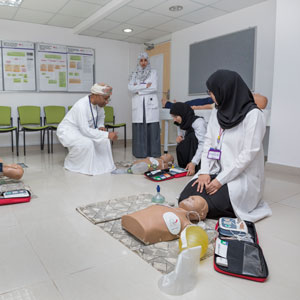
Histopathology
Through a structured curriculum based on graded responsibility and close monitoring and assessment of residents, the program will produce pathologists who have the knowledge, competencies and professional skills to work as independent and safe specialist pathologists.
he Histopathology Residency Training Program aspires to produce pathologists of international caliber providing high quality diagnostic services, education and research for improved health care in the country.
By the end of the training program, Residents are expected to: Perform independent macroscopic examination and dissection of surgical specimens. Provide accurate and timely intraoperative consultations (i.e. frozen section reports) during surgeries. Offer guidance to clinicians regarding the type of biopsy required and its proper submission to the laboratory. Take decisions on laboratory handling of critical specimens that require urgent reporting or specialized techniques. Report cervical smears and provide an appropriate follow up recommendation. Report non-gynecological cytology samples including body fluids and fine needle aspirates. Employ special techniques such as immunohistochemistry in order to arrive at a diagnosis or to provide therapeutic or prognostic information. Write comprehensive reports on all surgical pathology and cytology cases including any management recommendations. Offer expert opinion or guidance on patient management to clinical colleagues through multidisciplinary team meetings. Perform autopsies, identify gross and microscopic abnormalities, and interpret them to arrive at the cause of death. Be able to take appropriate photographs including photomicrography. Know self-limitations and when to seek second opinion for safe medical practice. Work in an ethical manner and maintain patient confidentiality. Develop time management skills. Develop an understanding of effective laboratory management including health and safety. Supervise and participate in internal and external quality control activities and audits. Maintain continuous professional development by keeping up to date with medical literature. Collaborate with colleagues effectively for better patient care. Manage a laboratory by learning to assess manpower, write job descriptions, standard operating procedures and to organize staff working pattern. Manage stock/equipment by developing knowledge of indenting materials and equipment, choosing and calibrating equipment and preventative maintenance. Maintain health and safety practices in the laboratory.
PROGRAM DIRECTOR:
DR. MARWA ABDULLAH HUMOOD AL RIYAMI
Duration of the Residency Training Program
The duration of the program is 5 years
General Outline of Rotations
65 Blocks for 5 Years
Each Block = 4 Weeks = 28 Days
Each year, four (4) weeks Annual Leave + one (1) week Study leave as per OMSB by-laws.
For R1:
Surgical Pathology 9 blocks
Cytopathology 2 blocks
Basic Laboratory Methods 1 block
Annual Leave 1 block
Total of 13 blocks
For R2-R4:
Surgical Pathology 25 blocks
Cytopathology 6 blocks
Autopsy 6 blocks (in R2)
Research 3 blocks (in R2, R3 and R4)
Annual Leave 3 blocks
Total of 39 blocks
For R5:
Advanced Mandatory Training Abroad
Training Centers
Main Training Centers
1.) Sultan Qaboos University Hospital
2.) Royal Hospital
3.) Khoula Hospital
Regional Hospital for other Rotations and/or Electives
1.) Armed Forces Hospital
2.) Royal Oman Police Hospital (Forensic Medicine Department)
Minimum Requirements for Admission
A medical degree (MD/MBBS) or equivalent.
Successful completion of internship.
Medically fit for the training.
Passing the OMSB admission examination and an interview for short listed candidates.
Provision of names of three consultant or senior consultant physicians as referees.
Provision of a letter from the sponsoring region to join full time training, for the whole period of the program (5 years).
Must pass the interview.
Evidence of proficiency in the English language.
A signed statement from the candidate to comply with rules and regulations of the training program of Oman Medical Specialty Board.
Must provide all Training Certificates.
General OMSB Evaluation Tools
Rad & Lab In-Training Evaluation Form
Research Block Evaluation Form
Evaluation Form for Presentation
Evaluation Form for Journal Club Presentation
Evaluation for Procedural Skills
Case-Based Discussion
Multisource Feedback (360-Degree Evaluation)
Rotation Evaluation
Trainer Evaluation by Residents
Research Mentor Evaluation Form
Studies and Research Progress Evaluation Form
Resident Professionalism Evaluation Form
Evaluation Form for Resident’s Teaching Session
Program Evaluation Form
Six-Month and Annual Evaluation Form
Professionalism Evaluation Form
FITER evaluation form for Hematology Program
SPECIALTY EXAMINATION REQUIREMENTS
R1
End of Year Written Exam
R2
End of Year Written Exam
End of Year Practical Exam consisting of short cases (surgical pathology and cytology)
R3
OMSB Part I equivalent (FRCPath Part I exam)
End of year practical exam consisting of short cases (surgical pathology and cytology)
R4
End of Year Written exam
End of year practical exam consisting of short cases (surgical pathology and cytology), long cases, OSPE stations, and VIVA questions
R5
OMSB Part II Equivalent (FRCPath Part II exam)
Program Academic Activities:
|
Program Director:
Dr. Marwa Abdullah Humood Al Riyami
Associate Program Directors:
Dr. Hunaina Mohammed Nasser Al Kindi, APD - KH
Dr. Ibrahim Nasser Saleh Al Haddabi, APD - SQUH
Dr. Nasser Hamed Mohammed Al Rahbi, APD-RH
Members:
Dr. Masoud Ali Salman Al Kindi
Dr. Maimuna Sultana Al Saadi
Medical Program Executive
Angelica Manalo
Telephone No.: +968 2418 1051
Email: histopathology@omsb.org
